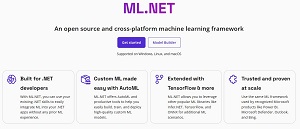Q&A
Machine Learning for .NET Developers Starts with ML.NET and AutoML
There's no more important topic than machine learning in the developer space right now as advanced AI constructs like ChatGPT and Microsoft's "Copilot" assistants are transforming the industry.
With software development's AI-powered future recently announcing itself, putting AI to work right now in your apps is a good way to position yourself for that future today.
"There are so many opportunities for developers to include it in a wide variety of applications," said Microsoft MVP (AI) Veronika Kolesnikova, a senior software engineer at Liberty Mutual.
She will help developers take advantage of those opportunities in an upcoming session titled "Machine Learning for .NET Developers" at the big Live! 360 conference set for November in Orlando.
"If you heard a lot about data collection and processing, creating and training models and ready to try it all yourself with the help of .NET, I'll show you where to start," said Kolesnikova, who has extensive experience in full-stack development using C#, .NET, Java and Typescript, Azure and AWS clouds.
For this session, of course, it's all about Azure and its built-in tooling that helps devs get started in ML regardless of their experience.
 [Click on image for larger view.] ML.NET (source: Microsoft).
[Click on image for larger view.] ML.NET (source: Microsoft).
"Your first completely functional ML.NET project won't take too long to create. In this session we'll talk about the specifics of ML.NET, its applications and see how Auto ML can be a good starting point," said the sought-after public speaker. She promises attendees will learn:
- To understand the base principles of ML.NET
- About the benefits of AutoML
- Practical knowledge on how to create ML.NET models using Model Builder
We recently caught up with Kolesnikova to learn more about her session in a short Q&A.
VisualStudioMagazine: What inspired you to present a session on machine learning for .NET developers?
Kolesnikova The goal of all my talks is to show developers how easy it is to start working with ML and AI without a lot of experience. Developers don't need to be professional data scientists in order to start using ML in their applications. I feel like .NET developers can feel extra intimidated by ML: they might feel they not only need special education, but also learn “data science specific” languages like Python and R.
 "With this talk I want .NET developers to see how they can use their favorite development language for their ML tasks and feel inspired to start creating and using custom ML models."
"With this talk I want .NET developers to see how they can use their favorite development language for their ML tasks and feel inspired to start creating and using custom ML models."
Veronika Kolesnikova, Sr. Software Engineer, Microsoft MVP (AI), Liberty Mutual
With this talk I want .NET developers to see how they can use their favorite development language for their ML tasks and feel inspired to start creating and using custom ML models.
With machine learning being integrated across various tech stacks, what sets ML.NET apart from other machine learning libraries, especially for .NET developers?
ML.NET allows .NET developers to build custom models that can be used everywhere: in the cloud, on-premises, on a device, etc without the need for switching between development languages. ML.NET can also be used to work with models trained with other technologies.
For developers new to machine learning, the tech and its processes can seem daunting. How does ML.NET simplify or streamline the learning curve, and what prerequisites would you suggest for those attending the session?
I think the main benefit of ML.NET that helps to simplify the process and save time is less context switching -- writing all the parts of the solution using one language and tech stack. Another very important feature is AutoML support. Although the attendees don't need to know anything about ML, I would recommend taking a look at how ML works and what model types/algorithms are available.
You've mentioned AutoML as a potential starting point. Could you expand on just one of its benefits, especially in the context of .NET development, and how it integrates with ML.NET?
AutoML saves a lot of time and effort when creating custom models. By saving time on routine tasks .NET developers can focus on other important tasks: solution architecture, model integration, etc.
The Model Builder tool is a highlight of ML.NET. In your experience, how has it changed the way developers approach building and training machine learning models?
AutoML is in the core of the Model Builder, so it allows to jump start a ML-based solution even without any experience. The democratization of ML and AI in general makes it easy for anyone to start using ML. Oh! Did I say the Model Builder was free?!
Machine learning models are only as good as the data they're trained on. How does ML.NET facilitate the process of data collection and processing, ensuring the creation of robust models?
ML.NET supports developers in all steps of the ML lifecycle: data organization and cleanup, model training and testing, retraining and MLOps. Before training a custom model it's important to understand the Responsible AI principles and data cleanup options. ML.NET has all the tools a developer can use for data preparation. Examples of data cleanup function from ML.NET: ReplaceMissingValues, NormalizeMinMax, NormalizeBinning.
As the technology landscape constantly evolves, where do you see the future of ML.NET in the broader spectrum of AI and machine learning, and what advice would you give developers looking to specialize in this area using .NET?
ML.NET is constantly evolving to keep up with all the latest ML features. With increasing popularity of AI more and more developers will want to start training custom models and using those models. I'm sure ML.NET can be a great starting point in .NET developers' machine learning journey. It's great as both learning tool and production ready tool. In the end everyone will decide for themselves how far they want to go: work with data, build custom models, use pre-built models, create MLOps setup, combine ML.NET with other languages and tools, etc.
Note: Those wishing to attend the conference can save hundreds of dollars by registering early, according to the event's pricing page. "Save up to $400 if you register by September 22!" said the organizer of the event, which is presented by the parent company of Virtualization & Cloud Review.
About the Author
David Ramel is an editor and writer at Converge 360.